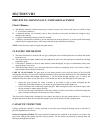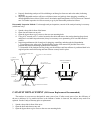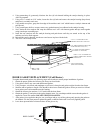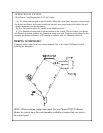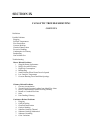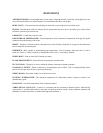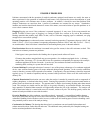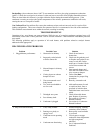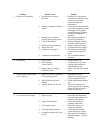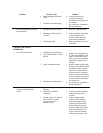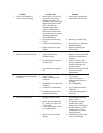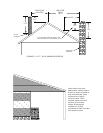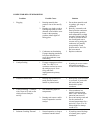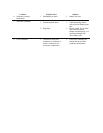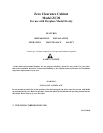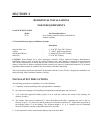
Problem
3. High Fuel Consumption
4. Backpuffing
5. Smoke Rollout When Heater
Door Is Opened
6. Low Catalytic Temperature
Possible Cause
1. Inexperience in catalytic
operation
2. Improper regulation of draft or
inlet air
3. Burning wet, unseasoned
wood or pitchy spongy wood
4. Cold, windy weather
5. Smoke bypassing combustor
6. Bypass stuck out
7. Combustor not engaged
8. Combustor not functioning
1. Gusts of wind
2. Hot combustor
(Above 1400
o
F)
3. Opening doors in a tightly
constructed house
1. Bypass is closed, or combustor
is in operating position
2. Wind gusts blowing down
chimney
3. Opening heater door too fast
1. Bypass is open
2. Light-off not obtained
3. Fuel charge is spent
4. Gases bypassing combustor
5. Combustor coated with fly ash
or soot
Solution
1. Operate stove with desired
heat output in mind. Do not be
overly concerned with
maintaining light-off
temperatures
2. Close inlet air control as much
as possible to maintain desired
heat output. Check gaskets,
reinstall fiberglass gasketing
around door and glass as
necessary
3. Burn seasoned wood that is
dry and of good quality
4. Weather stripping, caulking,
insulation, storm windows
5. Replace warped stove parts
6. If warped or broken, replace
7. Put combustor in operating
position or close bypass in
stove
8. See “Combustor-Related
Problems”
1. Install chimney cap
2. Avoid burning soft, pitchy
wood or large amounts of
small diameter wood
3. Slowly open and close outside
door
1. Open bypass or place
combustor in bypass position
before opening stove door
2. Install wind-resistant chimney
cap
3. Wait a few seconds after
opening bypass before opening
heater door to give smoke a
chance to exit heater
1. Once light-off temperatures
have been reached and unit is
stabilized, close bypass
2. Follow manufacturer’s
operating instructions
3. Refuel as necessary for
combustor operation
4. Check parts, particularly
bypass. Replace if warped.
5. See section on “Combustor-
Related Problems—Catalyst
Masking”



